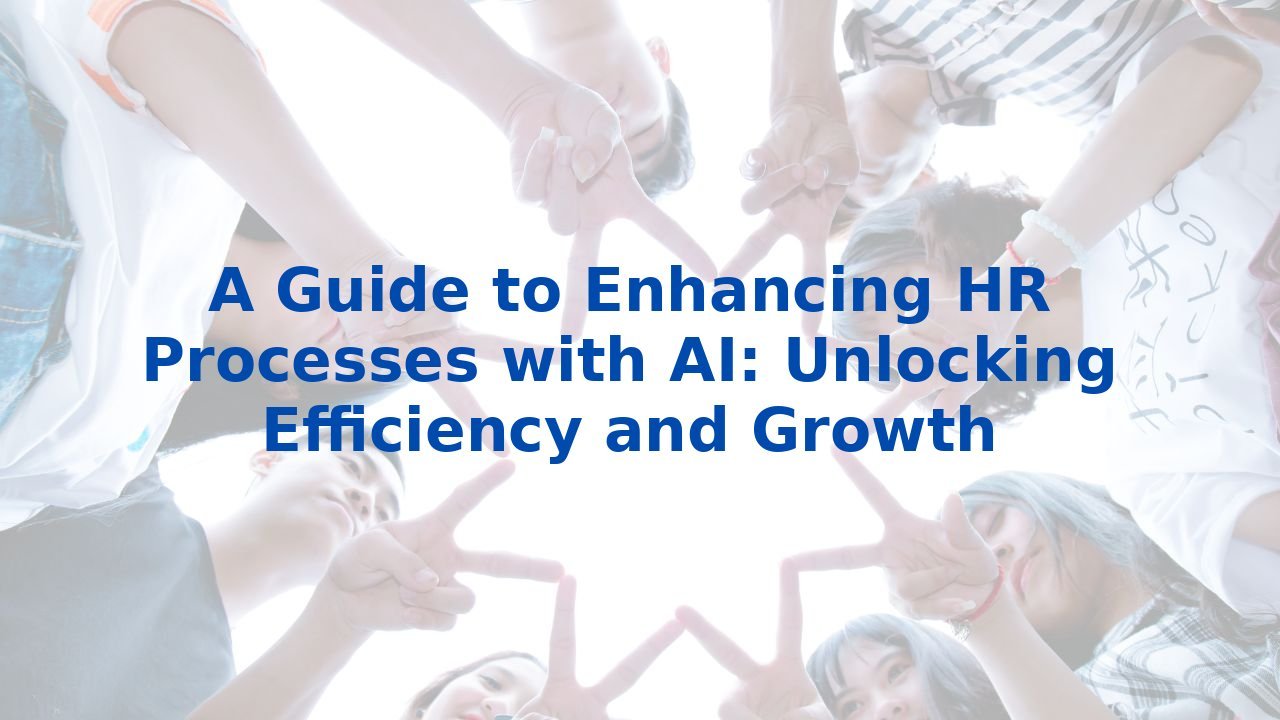A Guide to Enhancing HR Processes with AI: Unlocking Efficiency and Growth
A Guide to Enhancing HR Processes with AI: Unlocking Efficiency and Growth
In the modern business landscape, the pressures placed on Human Resources (HR) departments can be overwhelming. From managing employee experiences to ensuring compliance and fostering sustainability, HR professionals have their hands full. But what if there was a way to streamline these processes, allowing HR to focus on strategic growth rather than administrative tasks? Enter Artificial Intelligence (AI)—a game-changing tool that can revolutionize HR practices.
1. Comprehensive Review and Recommendations
One of the first steps in enhancing HR processes is to conduct a comprehensive review. This involves identifying areas for improvement that can lead to better employee experiences and compliance. AI can play a pivotal role in this phase by:
- Automating Data Collection: Imagine a world where data from employee feedback, performance metrics, and compliance records is gathered and analyzed effortlessly. AI can automate this process, leading to real-time insights.
- Identifying Trends and Patterns: With advanced algorithms, AI can detect underlying trends in workforce behavior, allowing HR professionals to pivot quickly and address issues before they escalate.
- Generating Recommendations: Based on comprehensive data analysis, AI can provide actionable recommendations, ensuring HR strategies are not just reactive but also proactive.
This level of data-driven decision-making can lead to significant enhancements within an organization’s HR framework, optimizing both efficiency and employee satisfaction.
2. Training New Supervisors and Developing Leaders
The growth of any organization heavily relies on effective leadership. Training new supervisors is crucial, and AI can elevate this process in a few remarkable ways:
- Personalized Learning Paths: Every supervisor has a unique set of challenges and strengths. AI can tailor individualized learning paths, ensuring that each new leader receives focused training aligned with their specific role and the organization’s overarching goals.
- Soft Skills Development: While technical skills are vital, soft skills like communication and leadership are equally important. AI-driven tools can simulate real-life scenarios, helping develop these essential competencies vital for nurturing effective leaders.
- Continuous Feedback: Imagine a scenario where supervisors receive not just one-off training but ongoing feedback. AI can provide real-time assessments that empower leaders to grow and evolve continuously.
By enhancing the training process, organizations can cultivate a new generation of leaders who are equipped to navigate challenges and inspire their teams.
3. Occasional Advice and Guidance
Not every business has the capacity to maintain a comprehensive HR team. For those seeking occasional guidance, AI can stand in as a reliable advisor:
- 24/7 Availability: HR inquiries can arise at any hour. AI tools provide instantaneous support, ensuring that businesses have access to HR guidance whenever they need it.
- Cost-Effective Solutions: Compared to hiring a full-time HR consultant, AI-driven solutions can offer quality insights at a fraction of the cost, particularly beneficial for small businesses with limited resources.
- Consistency in Advice: One strong advantage of AI is its consistency. By providing uniform guidance, organizations can minimize human error and ensure that all HR decisions adhere to established protocols.
This transformation can cultivate a sense of confidence and stability, laying the groundwork for a robust HR strategy.
Benefits of AI Training for Employees
As organizations adopt AI into their HR processes, training employees on how to leverage these tools is indispensable. Here are some benefits of investing in AI training:
- Improved Efficiency: Empowering employees with AI knowledge enables them to automate mundane tasks, freeing them up to focus on strategic initiatives that propel the organization forward.
- Enhanced Skill Sets: Employees equipped with AI competencies become invaluable assets. Their expertise not only makes them more productive but also positions the organization competitively in the market.
- Adaptability: In a landscape that is rapidly evolving, adaptability is critical. Employees trained in AI are better prepared to embrace change and efficiently integrate new technologies into their workflows.
Conclusion
Enhanced HR processes are no longer a luxury but a necessity for organizational success. AI allows HR professionals to automate data collection, identify trends, provide personalized training, and offer consistent guidance—transforming the way HR operates. With the additional layer of training for employees on AI applications, organizations not only increase efficiency but also foster a culture of continuous improvement. The future of HR looks promising, transforming a traditionally administrative function into a vibrant hub of innovation and growth.
Transform your HR experiences—embrace AI and unlock your organization's true potential!



